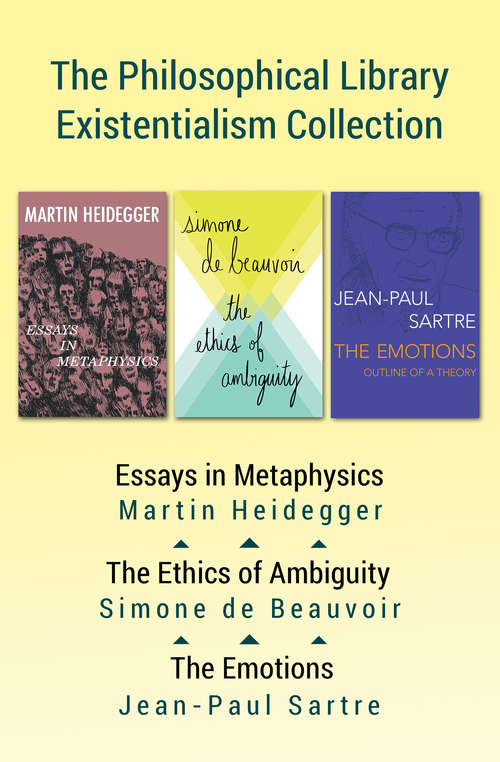The Philosophical Library Existentialism Collection: Essays in Metaphysics, The Ethics of Ambiguity, and The Emotions
By: and and
Sign Up Now!
Already a Member? Log In
You must be logged into Bookshare to access this title.
Learn about membership options,
or view our freely available titles.
- Synopsis
- Understand the concepts that shaped twentieth-century philosophy, theology, psychology, and art, with works by Martin Heidegger, Simone de Beauvoir, and Jean-Paul Sartre. Existentialism was born in the nineteenth century and came of age in mid-twentieth-century France. Here, three major texts offer an introduction to the philosophy, which emphasizes individual existence, freedom, and personal responsibility while acknowledging the suffering and dread that can accompany our striving for such values.Essays in Metaphysics: Identity and Difference by Martin Heidegger In the two lectures translated here, Heidegger provides illuminating insights and touches upon many a vital issue, including our technological age, religion, language, history, and more. His receptiveness, sensitivity, and ability to be at the heart of the problem are represented here, offering a deeper appreciation of the teacher and man who gave the world works such as Being and Time.The Ethics of Ambiguity by Simone de Beauvoir The second major essay by the groundbreaking author of The Second Sex and a classic introduction to Existentialist thought, The Ethics of Ambiguity simultaneously pays homage to and grapples with de Beauvoir’s French contemporaries, philosophers Jean-Paul Sartre and Maurice Merleau-Ponty, by arguing that the freedoms of existentialism carry certain ethical responsibilities. While contemplating nihilism, surrealism, existentialism, objectivity, and human values, de Beauvoir outlines a series of “ways of being” (the adventurer, the passionate person, the lover, the artist, and the intellectual) that allows us to live up to the responsibilities of freedom.The Emotions: Outline of a Theory by Jean-Paul Sartre French philosopher Jean-Paul Sartre attempts to understand the role emotions play in the human psyche. Sartre analyzes fear, lust, anguish, and melancholy while asserting that human beings begin to develop emotional capabilities from a very early age, which helps them identify and understand the emotions’ names and qualities later in life. Helping to complete the circle of Sartre’s many theories on existentialism, this vital piece of literature is a must-have for the philosopher-in-training’s collection.
- Copyright:
- 2016
Book Details
- Book Quality:
- Publisher Quality
- ISBN-13:
- 9781504049214
- Publisher:
- Philosophical Library/Open Road
- Date of Addition:
- 08/24/17
- Copyrighted By:
- Open Road Integrated Media
- Adult content:
- No
- Language:
- English
- Has Image Descriptions:
- No
- Categories:
- Nonfiction, Philosophy, Politics and Government
- Submitted By:
- Bookshare Staff
- Usage Restrictions:
- This is a copyrighted book.
Reviews
Other Books
- by Martin Heidegger
- by Simone De Beauvoir
- by Jean-Paul Sartre
- in Nonfiction
- in Philosophy
- in Politics and Government
